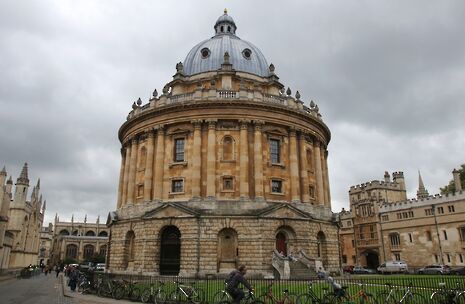Cambridge rises to second as Oxford tops THE world rankings
While Oxford held onto the top spot for the second year running, Cambridge overtook its American rivals to rank second

Cambridge has risen to second place in the Times Higher Education (THE) World University Rankings, while the University of Oxford has come out on top for the second year running.
Having placed fourth in last year’s rankings, Cambridge has this year overtaken the California Institute of Technology (Caltech), which ranked first between 2012 and 2016, and Stanford University. Both are now ranked joint third.
It is the first time in the rankings’ 13-year history that the two top spots have been held by British universities.
Professor Sir Leszek Borysiewicz, vice-chancellor of the University, told Varsity that the rankings confirm “that the University of Cambridge is among a small group of the most respected higher education institutions globally. We welcome the fact that UK institutions feature so highly in this year's rankings, demonstrating their continued importance to the country and its economy.”
THE said that one of the reasons for Oxbridge’s strong showing was a significant increase in both universities’ total institutional income. Oxford saw a 24 per cent increase and Cambridge 11 per cent, while Caltech and Stanford saw falls in revenue of 23 and 24 per cent respectively.
To produce the rankings, THE uses 13 different performance indicators which are grouped into five different areas: teaching; research; citations; international outlook; and industry income.
While the results are encouraging for the UK, THE said that they also underline the risk posed to British universities by Brexit. Nearly a quarter of Cambridge’s research funding from competitive grants comes from the EU, while for Oxford the same figure is nearly a fifth. The publication also noted that the the number of EU applicants for full-time undergraduate places at British universities declined by five per cent compared to last year.
Phil Baty, Editorial Director of Global Rankings at THE said that “the UK higher education system is facing intense political pressure, with questions over the value for money provided by £9,250 tuition fees in England, our continued attractiveness to international students, the flow of research funding and academic talent post-Brexit, and even levels of vice-chancellors' pay.”
“But one thing this new data makes absolutely clear is that the UK has many of the very best universities in the world and it has one of the world's strongest higher education systems.”
However, this year’s results also reflect a growing gap between the UK’s elite universities and those placed lower down. While Imperial College London, UCL, and LSE are ranked at eighth, 16th, and 25th respectively, other British universities saw a significant drop-off in performance.
Warwick fell nine places to 91st, and St Andrews dropped 33 placed to joint 143rd. 16 of the 31 British universities ranked in the top 200 saw a fall in performance compared to last year. Most of those that dropped down the table saw falls in their reputations for teaching and research.
Europe is now home to over half of the top 200 institutions globally, though is increasingly coming under pressure from Asia. There are seven European and three Asian institutions in the top 30 this year, compared with 10 and two last year. Two of China’s leading universities are now ranked higher than Germany’s top institution, LMU Munich.
These rankings follow the QS World University Rankings, which were released earlier this year. In those results, Cambridge dropped one place to fifth, though was still the top ranked British university. Oxford was ranked sixth, while UCL and Imperial were also included in the top ten.
The THE rankings are subject to an independent audit by PricewaterhouseCoopers, and claim to be the only global university rankings to be subject to such independent scrutiny.
The University of Oxford has been contacted for comment
 News / Colleges charge different rents for the same Castle Street accommodation2 March 2026
News / Colleges charge different rents for the same Castle Street accommodation2 March 2026 News / King’s hosts open iftar for Ramadan3 March 2026
News / King’s hosts open iftar for Ramadan3 March 2026 Theatre / Lunatics and leisure centres 4 March 2026
Theatre / Lunatics and leisure centres 4 March 2026 News / Angela Merkel among Cambridge honorary degree nominees27 February 2026
News / Angela Merkel among Cambridge honorary degree nominees27 February 2026 News / News in Brief: waterworks, wine woes, and workplace wins 1 March 2026
News / News in Brief: waterworks, wine woes, and workplace wins 1 March 2026








